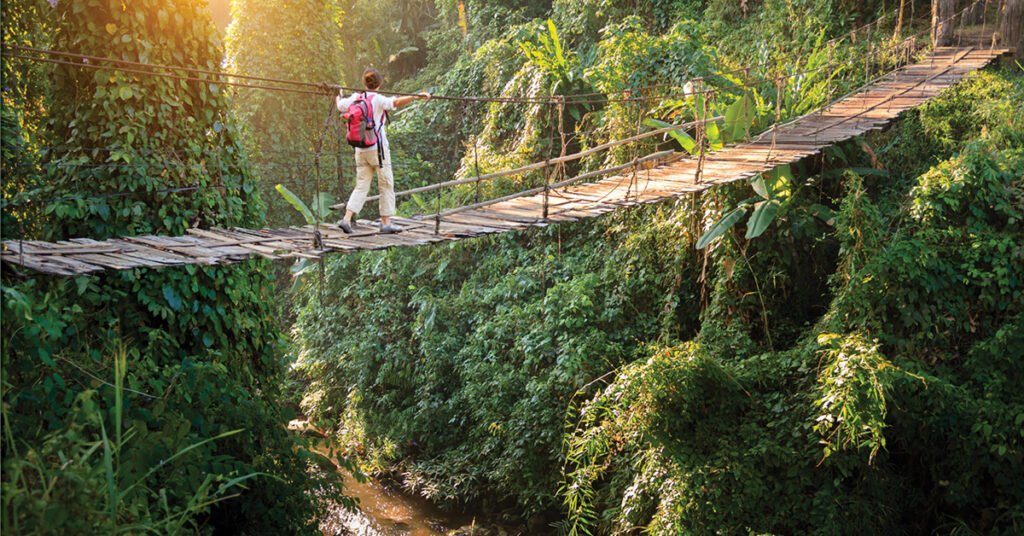Introduction
Ecotourism is travel with a purpose. It means visiting natural places to appreciate and learn about the environment while minimizing harm and supporting local communities. Unlike mass tourism, ecotourism focuses on conservation, education, and sustainable benefit for people who live in the places we visit. This article explains what ecotourism is, why it matters, its key principles, benefits and challenges, examples of ecotourism activities, and practical tips for travelers who want to do it right.
What is Ecotourism?
Ecotourism is a form of sustainable tourism that emphasizes experiencing natural environments in ways that conserve ecosystems and respect local cultures. It usually involves small groups, low-impact activities, and opportunities to learn from naturalists, park rangers, or community guides. At its best, ecotourism creates a positive loop: visitors bring money and interest that help protect habitats, and in turn, healthy ecosystems provide meaningful experiences.
A Short History
The idea of ecotourism emerged in the late 20th century as travelers and conservationists grew concerned about the negative effects of mass tourism. Over time, ecotourism gained recognition as a tool for conservation financing and local development. Many protected areas now rely partly on visitor fees and guided tours to fund park management and anti-poaching work. While the concept has evolved, the core goal remains: make travel part of the solution rather than part of the problem.
Core Principles of Ecotourism
- Minimize Impact: Reduce resource use and waste. Stay on marked trails, avoid feeding wildlife, and choose accommodations that use water and energy responsibly.
- Build Environmental Awareness: Activities should teach visitors about local ecosystems and conservation challenges. Good ecotours include interpretation and learning moments.
- Support Local Economies: Local guides, community-run lodges, and locally produced food help ensure tourism benefits local people.
- Respect Local Cultures: Accept and learn from cultural differences. Seek permission before photographing people and follow local customs.
- Provide Direct Benefits for Conservation: Revenue from ecotourism should contribute to habitat protection, scientific research, and community projects.
Benefits of Ecotourism
- Conservation Funding: Visitor fees, donations, and volunteer programs can finance park management, wildlife protection, and habitat restoration.
- Economic Opportunities: Ecotourism creates jobs for local guides, artisans, lodging staff, and cooks. It can provide an alternative income to activities that harm ecosystems, such as logging or unsustainable fishing.
- Education and Awareness: Travelers often return home with new knowledge and motivation to support conservation causes.
- Cultural Pride and Preservation: Local communities can showcase and preserve traditional practices, crafts, and storytelling as part of the visitor experience.
Challenges and Risks
Despite its promise, ecotourism can fail to meet its goals. Common problems include:
- Greenwashing: Some operators claim to be ‘eco’ without meaningful practices. Checking credentials and reviews helps.
- Overuse of Fragile Sites: Too many visitors can damage trails, disturb wildlife, and strain local services.
- Unequal Benefits: Profits sometimes flow to outside companies instead of local communities.
- Cultural Disruption: Poorly managed tourism can change local traditions and raise prices for residents.
Addressing these risks requires good planning, local governance, and transparent partnerships between communities, conservation groups, and tourism operators.
Typical Ecotourism Activities
- Guided Nature Walks and Birdwatching: Small-group walks with trained guides who explain local flora and fauna.
- Wildlife Safaris (Low-Impact): Responsible viewing rules keeping distance, limiting vehicles protect animals.
- Community Homestays and Cultural Exchanges: Staying with local families provides direct income and cultural learning.
- Volunteer Conservation Projects: Short-term projects help with habitat restoration or wildlife monitoring, when run ethically.
- Marine Ecotourism: Snorkeling and reef monitoring that follow strict no-touch rules help protect coral and fish.
How to Choose a Responsible Ecotourism Experience
- Research the Operator: Look for operators that hire local guides, use local accommodations, and publish conservation or community commitments.
- Ask Where the Money Goes: Reputable operators explain how fees support conservation and local livelihoods.
- Prefer Small Groups: Smaller groups reduce environmental impact and improve the quality of the experience.
- Check Certifications Carefully: Certifications can help but are not a guarantee. Read what a certificate actually measures.
- Read Recent Reviews: Feedback from other travelers often reveals whether an operator truly follows ecotourism practices.
How Travelers Can Practice Ecotourism
- Pack Light and Smart: Fewer items mean less fuel used for transport. Bring reusable water bottles, bags, and containers.
- Respect Wildlife: Observe quietly and from a distance. Never feed wild animals.
- Support Local Businesses: Eat local food, buy crafts directly from makers, and choose locally owned lodges.
- Minimize Waste: Avoid single-use plastics and dispose of trash responsibly. Take used batteries and electronics home for proper recycling if local facilities lack them.
- Follow Local Rules: Stick to trails, respect no-entry signs, and obey seasonal closures designed to protect nesting or breeding wildlife.
Ecotourism and Policy: What Helps Make It Work
Governments and NGOs play a key role in making ecotourism sustainable. Clear land-use planning, protected area management, visitor limits, and benefit-sharing agreements help balance conservation with tourism. Funding for local capacity-building such as training guides and improving small business skills ensures communities receive real benefits.
Emerging Trends
- Community-Led Tourism: More communities are leading experiences themselves rather than depending on external operators.
- Technology for Monitoring: Apps, camera traps, and acoustic sensors help managers monitor visitor impact and wildlife responses.
- Climate-Conscious Travel: Travelers and operators increasingly measure and reduce carbon footprints by choosing lower-emission transport and offsetting responsibly.
Conclusion
Ecotourism can be a powerful force for good when done thoughtfully. It offers travelers unforgettable experiences while supporting conservation and local livelihoods. The key is to be intentional: choose operators carefully, respect nature and culture, and seek out experiences that give back. When travelers, communities, and conservationists work together, ecotourism becomes more than a trip it becomes a tool for protecting the natural world.
